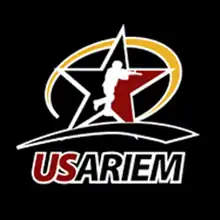United States Army Research Institute of Environmental Medicine
The U.S. Army Research Institute of Environmental Medicine (USARIEM) is the U.S Army’s main institution and facility for military environmental medicine and exercise physiology research. It is located at Natick, Massachusetts, within the U.S. Army Soldier Systems Center (SSC) installation, but is a subordinate lab of the U.S. Army Medical Research and Materiel Command (USAMRMC), headquartered at Fort Detrick, Maryland, USA.
| U.S. Army Research Institute of Environmental Medicine | |
|---|---|
 The USARIEM logo | |
| Active | 1961–present |
| Country | |
| Branch | |
| Type | Medical R&D Command |
| Role | Military medical research and development |
| Garrison/HQ | U.S. Army Soldier Systems Center, Natick, Massachusetts, USA |

Mission
USARIEM’s Mission Statement mandates that the Institute:
Provide solutions to enhance Warfighter health and performance through medical research.
The Institute has four divisions, each relating to military human performance as it relates to the environment — Biophysical and Biomedical Modeling, Military Nutrition, Military Performance, and Thermal and Mountain Medicine. Research in the divisions focuses on three elements: the servicemember (acclimation; body size; gender; race; age; health; hydration; nutrition; fitness; and sleep status), the environment (temperature; wind; humidity; and altitude), and the mission (work — intensity, duration, and type; clothing and equipment; and medications).
Research on the effect of environmental pollutants on military personnel is not part of USARIEM's mission, but is within the purview of the U.S. Army Center for Environmental Health Research at Fort Detrick, Maryland.
History
USARIEM traces its institutional lineage back to 1927 and the Harvard Fatigue Laboratory. That facility fostered two institutions that ultimately merged. The first was the Climatic Research Laboratory in Lawrence, MA (1943–54), which relocated to Natick in 1954 under the new name of the Environmental Protection Research Division (EPRD) of the U.S. Army’s Quartermaster Research and Engineering Command. The second was the Armored Medical Research Laboratory (AMRL) at Fort Knox, KY (1942–61) elements of which joined with the EPRD in 1961 to constitute the present USARIEM facility and organization.
Products and capabilities
USARIEM’s basic and applied research capabilities are focused upon biomedical evaluations, health hazard assessments, countermeasures development and a rapid response to a diverse range of environmental threats and problems. Products include individual soldier equipment and rations; guidelines pertaining to training policy and preventive medicine; and performance monitoring strategies and predictive algorithms.
Research Divisions
Research divisions within USARIEM consist of Biophysics and Biomedical Modeling (which develops wearable biosensors and biomedical models to simulate effects of heat, cold, high altitude, hydration, nutritional status and clothing systems and equipment)[[1][2][3]], Military Performance (which researches performance enhancements [physical, cognitive, behavioral, psychomotor] in military occupational tasks),[4][5][6] Military Nutrition (which researches nutritional issues, including new rations, affecting service members),[7][8][9] and Thermal and Mountain Medicine (which researches physical and cognitive work capabilities and medical problems associated with military operations at high terrestrial altitude or temperature extremes).[10][11][12]
Facilities
USARIEM maintains several unique or highly specialized facilities:
- Hypobaric Chamber Facility or HCF (altitude chambers)
- Two Class D chambers (man-rated) rarefied air atmosphere, non-oxygen enriched
- Large Study Chamber: internal volume of 2000 cu. ft. (floor area 200 sq. ft.)
- Small Study Chamber: internal volume of 1100 cu. ft. (floor area 108 sq. ft.)
- Environmentally controlled (altitude, temperature, humidity) & connected by an airlock
- Simulates altitudes of 800-225 Torr (sea level to 9000 m)
- Temperatures from -32 °C to 43 °C
- Relative humidity (Rh) between 20-80% (dew point dependent)
- 23,656 simulated altitude exposures of human volunteers over 33 years of studies[13]
- Two Class D chambers (man-rated) rarefied air atmosphere, non-oxygen enriched
- 13 Environmental Chambers
- Temperatures from -10 °C to 50 °C
- 5 Biophysical Evaluation Chambers
- Temperatures from -10 °C to 50 °C
- Biomechanics Laboratory
- Water Immersion Laboratory[14]
- Temperatures from 5 °C to 45 °C
- Human Exercise Physiology Laboratory
- Human/Animal Physiology Laboratory
- Psychology Laboratory
- Electron Microscopy Laboratory
- Animal Housing and Care Facility
- Doriot Climatic Chamber Complex
- Temperatures from -57 °C to 74 °C
- Laser and Flow Cytometry
Off site:
- United States Army Pike’s Peak Research Laboratory
- Located in Colorado at 4,300 m
List of USARIEM commanders
| Number | Tenure | Commander |
|---|---|---|
| 1 | 1961–1962 | CPT Robert J. T. Joy, MD |
| 2 | 1962–1965 | LTC William H. Hall, MD |
| 3 | 1965–1971 | COL James E. Hansen, MD |
| 4 | 1971–1976 | COL LeeRoy G. Jones, MD |
| 5 | 1976–1980 | COL Harry G. Dangerfield, MD |
| 6 | 1980–1982 | COL Eliot J. Pearlman, MD |
| 7 | 1982–1984 | COL Ernest M. Irons Jr., MD |
| 8 | 1984–1986 | COL Brendon E. Joyce, MD |
| 9 | 1986–1989 | COL David D. Schnakenberg, PhD |
| 10 | 1989–1990 | COL Joseph C. Denniston, DVM |
| 11 | 1990–1994 | COL Gerald P. Krueger, PhD |
| 12 | 1994–1997 | COL Joel T. Hiatt, MS |
| 13 | 1997–2000 | COL David M. Penetar, PhD |
| 14 | 2000–2003 | COL John P. Obusek, PT, PhD |
| 15 | 2003–2006 | COL Karl E. Friedl, PhD |
| 16 | 2006-2008 | COL Beau J. Freund, PhD |
| 17 | 2008-2010 | COL Kevin Keenan, M.D., M.P.H. |
| 18 | 2010-2012 | COL Gaston P. Bathalon, RD, PhD |
| 19 | 2012–2014 | COL Deborah L. Whitmer, D.V.M. |
| 20 | 2014-2016 | COL Thomas G. Eccles III, M.D. |
| 21 | 2016–2018 | COL Raymond Phua, tDPT |
| 22 | 2018–2020 | COL Sean S. O'Neil, PhD |
| 23 | 2020-2022 | COL Troy Morton, PhD |
| 24 | 2022-present | COL Michael I. Cohen, DO |
References
- Potter; et al. (2017). "Mathematical prediction of core body temperature from environment, activity, and clothing: The heat strain decision aid (HSDA)". Journal of Thermal Biology. 64 (64): 78–85. doi:10.1016/j.jtherbio.2017.01.003. PMID 28166950.
- Gonzalez; et al. (1997). "Heat strain models applicable for protective clothing systems: comparison of core temperature response". Journal of Applied Physiology. 83 (3): 1017–1032. doi:10.1152/jappl.1997.83.3.1017. PMID 9292490. S2CID 23305552.
- Buller; et al. (2015). "Real-time core body temperature estimation from heart rate for first responders wearing different levels of personal protective equipment". Ergonomics. 58 (11): 1830–1841. doi:10.1080/00140139.2015.1036792. PMID 25967760. S2CID 22734718.
- Seay; et al. (2014). "Lower extremity biomechanical changes associated with symmetrical torso loading during simulated marching". Military Medicine. 179 (1): 85–91. doi:10.7205/milmed-d-13-00090. PMID 24402991.
- Proctor; et al. (2015). "Neurocognitive Performance and Prior Injury Among US Department of Defense Military Personnel". Military Medicine. 180 (6): 660–669. doi:10.7205/milmed-d-14-00298. PMID 26032381.
- Heaton; et al. (2014). "Attention and visual tracking degradation during acute sleep deprivation in a military sample". Aviation, Space, and Environmental Medicine. 85 (5): 497–503. doi:10.3357/asem.3882.2014. PMID 24834562. S2CID 25698302.
- McClung; et al. (2006). "Prevalence of iron deficiency and iron deficiency anemia among three populations of female military personnel in the US Army". Journal of the American College of Nutrition. 25 (1): 64–69. doi:10.1080/07315724.2006.10719516. PMID 16522934. S2CID 36905133.
- Pasiakos; et al. (2015). "The effects of protein supplements on muscle mass, strength, and aerobic and anaerobic power in healthy adults: a systematic review". Sports Medicine. 45 (1): 111–131. doi:10.1007/s40279-014-0242-2. PMID 25169440. S2CID 23197226.
- Lieberman; et al. (2002). "Effects of caffeine, sleep loss, and stress on cognitive performance and mood during US Navy SEAL training". Psychopharmacology. 164 (3): 250–261. doi:10.1007/s00213-002-1217-9. PMID 12424548. S2CID 15325147.
- Castellani; et al. (2001). "Thermoregulation during cold exposure after several days of exhaustive exercise". Journal of Applied Physiology. 90 (3): 939–946. doi:10.1152/jappl.2001.90.3.939. PMID 11181604. S2CID 16071697.
- Cadarette; et al. (2006). "Intermittent microclimate cooling during exercise-heat stress in US army chemical protective clothing". Ergonomics. 49 (2): 209–219. doi:10.1080/00140130500436106. PMID 16484146. S2CID 45560619.
- Sawka; et al. (2005). "Human water needs". Nutrition Reviews. 63 (suppl 1): S30-9. doi:10.1111/j.1753-4887.2005.tb00152.x. PMID 16028570. S2CID 24583130.
- DeGroot DW, Devine JA, Fulco CS (September 2003). "Incidence of adverse reactions from 23,000 exposures to simulated terrestrial altitudes up to 8900 m". Aviat Space Environ Med. 74 (9): 994–7. PMID 14503681. Retrieved 2008-06-05.
- Forte, V (2003). "Water Immersion and Re-Warming Facility of the Thermal and Mountain Medicine Division". US Army Research Inst. Of Environmental Medicine Thermal and Mountain Medicine Division Technical Report (USARIEM–TN03–04). Archived from the original on April 15, 2013. Retrieved 2008-09-30.
{{cite journal}}: CS1 maint: unfit URL (link)
- This article contains information that originally came from US Government publications and websites and is in the public domain.
